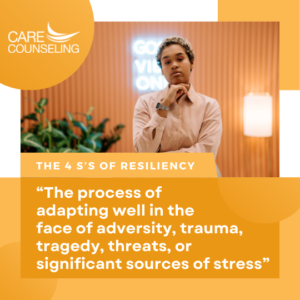
No one is immune to experiencing stress, trauma, or other challenging situations that shake our foundation of safety and security. Reflecting on the last year, many have experienced serious medical and mental health problems or have been impacted by conditions affecting loved ones. Stressors affecting finances and relationships have been prevalent. Suffering is inevitable as it is part of the human condition. Yet during times of suffering, there can also be tremendous growth through healing and rebuilding.
One of my favorite strengths is resiliency. Despite all the challenges that people face, resiliency can help give strength to overcome hardship. “The process of adapting well in the face of adversity, trauma, tragedy, threats, or significant sources of stress” is how psychologists define resilience.
One of the awesome CARE Vault Resources is the 4’s of Resiliency
https://care-clinics.com/the-four-ss-of-resiliency/
This strategy can be used to help reflect on
past events that were challenging for you and identify the supportive people, strategies, sagacity “sage advice” and solutions that have been helpful.
As we enter the winter months and holiday season, this strategy can also be utilized as a proactive measure to create a Resiliency Plan. This is something that can be created with your therapist as you prepare to enter into a challenging season of life.
Here is How to Get Started:
1. Identify Supportive People
Think about people that you can count on, those who can help support you during times of difficulty. Make sure that you have their current contact information accessible in your phone.
If you are struggling to identify supportive family or friends, add in the names of professional supports. This includes your local crisis number or hotlines.
Mental Health Crisis Services: Call **CRISIS (274747) or Text: MN to 741741
National Suicide Prevention Lifeline: 1-800-273-8255
2. Identify Coping Strategies
Think about what strategies have helped in the past to figure out what would be effective in the future. Some examples include relaxation, distraction, self-soothing strategies, mindfulness, and finding an outlet to process emotions.
3. Sagacity “Sage Advice” or “Words of Wisdom”
Write down saying that are meaningful to you. They can come from a loved one, a poet or author, a psychologist, a spiritual leader, etc. Think about words and insights that are meaningful and personalized to you. Try keeping a journal of inspirational quotes that you can go back to during times of struggle.
4. Solution Seeking
Write down some possible solutions that can help get through challenging situations. Perhaps exploring options with one of your supportive persons may lead to asking questions that reveal possible solutions. Maybe learning new skills can help if you are searching for new strategies. What about creating an action plan?
We’re Here to help
Our wellness experts will be happy to take care of you. You can CLICK HERE to schedule an appointment now or call (612)223-8898.
Meet Clinicians
We’re united by our commitment to providing effective, relevant, and innovative mental health support at all stages of your journey. Click Here to find out more about who we are, where we come from, and how we live out CARE’s mission every day.
The professionals at CARE are actively collecting and creating resources to help with what you need. We’re Here for You.



